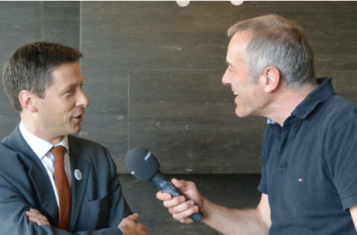Democracy International: What’s your bet: What will be the result of UK's EU membership referendum on 23 June 2016?
Matt Qvortrup: The majority of voters will decide to leave the EU.
Why do you predict this result?
Prime Minister Cameron is making huge mistakes: He does not talk about facts, but instead he is scaremongering and generating paranoia. For example, Cameron said that again there could be war in Europe if Great Britain leaves the EU. Also, Cameron focusses on economic predictions by bankers to argue that Great Britain should remain in the EU. But people do not trust bankers.
At the same time, the Leave-Campaign is not playing it smart either. For example, there was a poster by Boris Johnson’s campaign (“Vote Leave. Take back control”) that said: “Halt the German advance”. So this poster was pretty racist. It does not make concrete arguments but just plays with emotions. Moreover, the claim that Great Britain sends 300 million British Pounds to the EU each day is completely off concrete facts. Yet, the No-Side uses this figure over and over again. So people start believing in it.
Overall, one can say that IF Cameron wins the referendum, then because the Leave-side also made huge mistakes.
The referendum on 23 June is the 45th referendum on EU membership and European integration since 1972. What is special about this one?
The upcoming UK vote is a “de jure referendum”. This means, the UK will legally have to leave in case the majority of voters decide so. In case of such a Brexit, the repercussions could be huge for the EU. For example, Geert Wilders, leader of the Dutch Freedom Party, said the no vote spelled ‘the beginning of the end of the EU’. Whether this will happen or not, one must not forget that already there have been very important referendums in the past also, such as the referendums on the European Constitution in the Netherlands and in France back in 2005.
How do you judge the way Prime Minister David Cameron initiated the referendum, which is strictly speaking a plebiscite as the Government initiated it?
David Cameron did not trigger the referendum in a clever way. He had promised to fundamentally reform the EU in case of being re-elected in the general elections of 2015. But Cameron could not deliver a “fundamental reform of the EU”. Angela Merkel and Francois Hollande were against it. So Cameron only could come back from Brussels with a deal that just touched upon a few issues, such as the issue of child benefits and migration. With this deal, he wanted to please the anti-EU parties Ukip and Labour. Also one motivation for Cameron to hold the referendum was to keep the governing party, hence the Tories together. But this failed, today the Government is divided on whether to vote yes or no.
Overall, one can say Cameron acts like Britney Spears, or Cameron’s style of politics is like “Britney Spears politics” in terms of “Oops, I did a mistake again”.
What about the media. Do they play a fair role in the campaign?
With regards to the media in the UK one needs to see that the newspapers in general are much more biased and take sides than in continental Europe.
In this view it’s only The Guardian, The Financial Times and The Mirror who are pro remain. In contrast, The Daily Mail, The Daily Telegraph, The Times, The Sun and The Express advocate a leave-vote.
The BBC tried to be neutral. But in their attempt to be neutral they have become more for Brexit as they failed to ask the difficult questions. For example, the BBC did not challenge the claim by “Vote Leave. Take Back Control” that Great Britain sends 300 British Pounds each day to the EU. Nevertheless one needs to note that overall, the BBC is pretty fair.
Interview by Cora Pfafferott
Credits of Photo with Matt Qvortrup (left column) by Twitter @drqvortrup.




